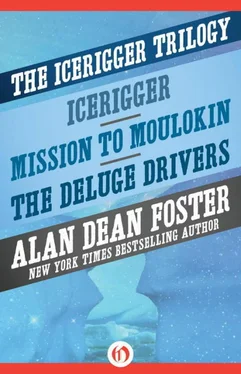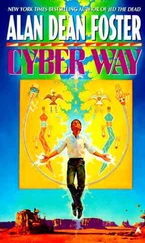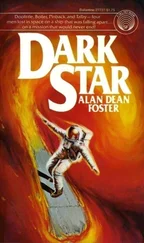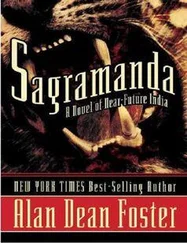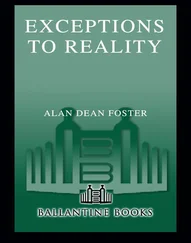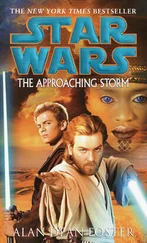Before long a cry came from the lead raft in the triangular formation. They had reached the end of the frozen river. Cables were cast off and neatly coiled aboard the Slanderscree. Finally the last was disengaged and all seven tow rafts had moved carefully downriver from the icerigger.
The wind here was dispersed, indecisive. Quickly, Ta-holding had sail put on as the huge raft slid slowly but aimlessly on the ice. Orders were given, spars adjusted. A sound new to the ears of Tran sailors penetrated the mists: a deep, impressive rumbling. The icerigger was now traveling on land.
It stopped.
Lookouts forward reported that the first two sets of wheels were resting on a gentle beach of gravel and grass-covered rock. Ta-hoding considered. Obviously, they had to put on more sail. But he was still leery of sailing on naked soil. Williams, who was standing nearby on the helmdeck, did his best to reassure him.
The plump captain remained skeptical. “I would rather have good, solid ice beneath my runners than,” he made it sound obscene, “bare ground. Still, we must gain more wind.”
Additional sail was unfurled, positioned. The strongest, steadiest breeze came from the north. Ta-hoding ordered the necessary shift in sail position. Fresh sheets of woven pika-pina billowed out to match the captain’s belly. An incredible creaking and groaning rose from beneath the raft’s hull, startling unprepared sailors who were used to traveling across silent, smooth ice. The crunching of stone under massive wheels was a disturbing new sound to them. It reminded some of a ship’s timbers breaking loose.
However unaesthetically, the third, fourth, fifth and eventually the sixth set of wheels moved inland, followed finally by the single steering wheel. There was a modest cheer of appreciation from the watching Moulokinese on the rafts astern as the Slanderscree rumbled awkwardly but steadily upslope.
Gaining confidence, Ta-hoding ordered a few additional small sails unfurled. The icerigger picked up speed. There was a cry and gesture of fond departing from the bow of the nearest tow ship. Ethan and Hunnar returned minister Mirmib’s arm action.
“I wonder if we shall see them again,” said Hunnar fondly.
“Not if, but when,” Ethan commented with surprising confidence. “Sofold and Moulokin now belong to the same confederation, the union of ice, remember?”
Hunnar looked abashed. “New ideas take root slowly on my world, friend Ethan. It is still difficult for me to comprehend the meaning of so many new and strange things, all of which have taken place since your arrival in Sofold such a short time ago. I suspect that as we have more and more contact with your people, with the peoples of other worlds, events will change still more rapidly for me and for all Tran.”
“I expect they will, Hunnar,” Ethan confessed. The knight’s words raised conflicting emotions within him. Had they chosen the right course in trying to rush these people into a galactic government? In their own way the Tran struck him as being reasonably happy with their place in the universe. Who could predict what influence some of the less lofty elements of humanx civilization would have on this proud, self-sufficient people? Despite all safeguards, such elements would find their way onto Tran-ky-ky as surely as any parasite infects an unwary host.
And what was the justification for their actions thus far? The threat of a little commercial exploitation on one corner of a vast, frozen globe? Such exploitation would, if unchecked, eventually smother the hopes of this world of course, but still…
Then he thought back to the killings, to all the horrors he’d heard about the nomadic hordes of Tran-ky-ky. Of the depredations they made on innocent city-folk, of whole cities wiped out and the intermittent rule of true barbarism on this planet. He considered the individual cruelties practiced by hereditary rulers unfit for their positions of power, Tran leaders the like of Tonx Ghin Rakossa of Poyolavomaar and Calonnin Ro-Vijar of Arsudun.
No, on balance, the ledger rode high on the side of their intervention. He, Ethan Frome Fortune, absolved himself of wrong-doing. What he and his companions were attempting was done not as Counselor Firsts of the United Church, nor as ministers of the Commonwealth, but solely because they were the ones unexpectedly afforded a chance to Do Something.
It was being done by a salesman, himself. By a teacher who was as gentle and considerate a human as he’d ever met. By a reclusive giant who was something more than a cabinet minister and less than a saint. These three were committed to helping the Tran, and the Tran were now committed to helping themselves. If many more meetings like the one which had joined Moulokin and Sofold took place, their personal decisions would all be justified.
Such lofty thoughts kept away the brutal alien cold outside his survival suit, kept him from musing on another likely possibility—that he might die in a lost cause on this distant, unnoticed, and wholly inhospitable world.
THE ICE RIVER HAD long since vanished behind them, and the sailors of the Slanderscree continued to exclaim in wonder at the thickness of the mists. They were familiar enough with the phenomenon. Volcanic foundries were located atop the mountain crests dominating their home isle of Sofold. But not in such profusion as this. Boiling pools and streams ran downslope wherever they looked. The quantity of freely flowing water was as alien to the Tran as a river of liquid oxygen would have been on Terra.
To everyone’s relief, the terrain, which proved the least of their problems, continued to incline gently upward, smooth earth and gravel interrupted only by the occasional pool or stream. The broadest volcanic fissure they had to cross was less than a meter wide. There were no crevasses or secondary canyons.
As if to compensate for the unexpectedly regular topography, obstacles were provided in the form of occasional trees too massive for the slowly advancing icerigger to push down. These grew thickly enough so that at least twice a day the raft would be forced to halt while a crew went overboard to cut down the upcoming barriers. At least the bottom of the hull was high enough to clear even the broadest stump.
They also either passed over or ground inexorably through a profusion of ground cover as foreign to the Sofoldian Tran as was the running, steaming water. Bushes and small trees, ferns and bromeliads smothered the surface wherever sufficient soil had collected to support extensive root growth. These were the strange plants of which minister Mirmib had spoken to Ethan when they’d first entered Moulokin harbor.
Such vegetation could exist in this place solely because of the heat and humidity furnished by the volcanic springs. Ethan and Williams debated extensively on the origin of the grotesquely anomalous tropical vegetation, as to whether it originated because of the conditions existing in this region, or was some holdover from a warmer climate in Tran-ky-ky’s distant past.
Great wheels plowed through rotted, fallen logs, scattering hordes of tiny crawling things and sending pulped fungi flying. Twelve wheels kept the raft from bogging down in the occasional softer areas.
Williams tried to estimate how much altitude they’d gained, but discovered that the mist and steam made accurate calculation impossible. His guesses at linear distance traveled were more precise. The fog made standard navigation impossible. Ta-hoding simply kept them headed eastward and hoped they were still traveling up the main canyon.
In places where the terrain leveled, out they encountered not only bushes and ferns, but berries and the first flowers Ethan had seen on Tran-ky-ky. Though the blooms fascinated the Tran, Ethan thought them pretty but familiar. Williams was utterly absorbed in speculation on how they were pollinated, not to mention explaining the process itself to the Tran wizard Eer-Meesach.
Читать дальше
